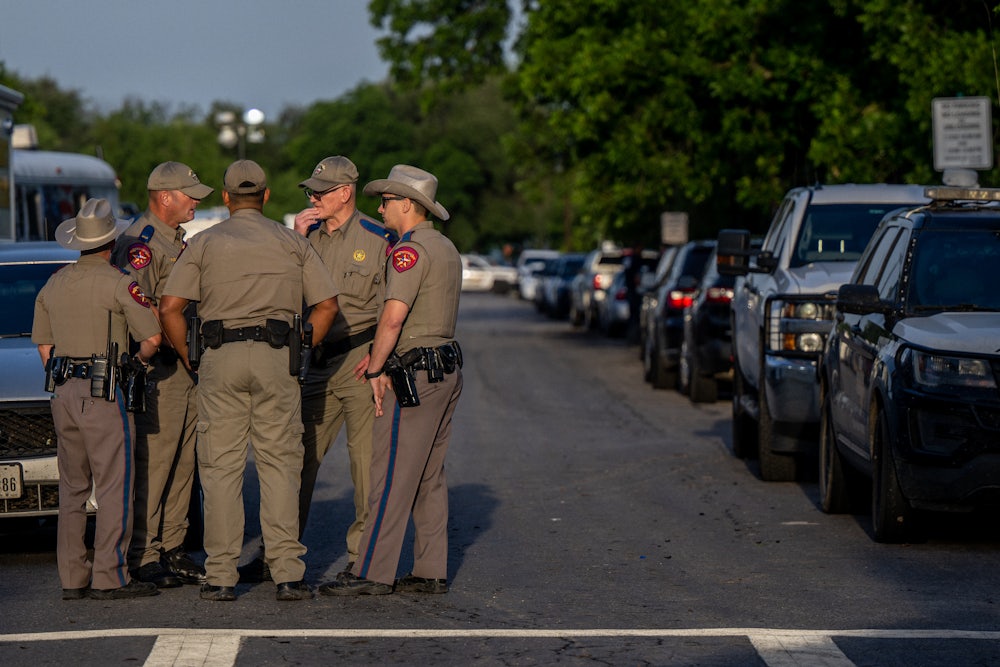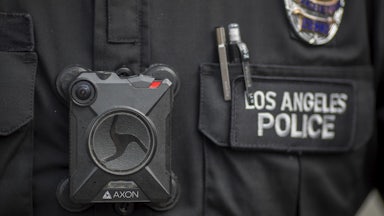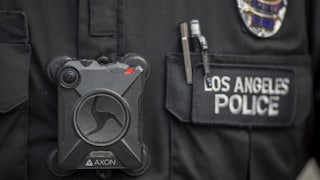Like many Americans, I spent the last week or so thinking often about the massacre of 19 young kids at an elementary school in Uvalde, Texas. Two teachers were also killed, and the husband of one of those teachers suffered a fatal heart attack a few days later, leaving their four children without parents. The community’s grief is, by all accounts, overwhelming. And even in a country that’s grown somewhat inured to mass shootings, this one stood out.
In the days since the tragedy, what we’ve learned about the shooting and the police response to it looms as something even more disturbing. Though officials initially said a school police officer exchanged fire with the body-armor-wearing gunman when he arrived on campus, they later admitted that no such confrontation happened and that the gunman wasn’t wearing body armor. When officers did arrive on the scene, state officials acknowledged to reporters late last week, they did not confront the gunman until nearly 90 minutes after the murders began. News outlets reported on Tuesday that the local police department and its school counterpart are no longer cooperating with state investigators.
In the most immediate sense, that decision raises a host of questions. Could more lives have been saved if police had interceded more swiftly? Why did officers on the ground ignore training that urged them to act more quickly and decisively? For me, it also raises a more legalistic question: Why did the police officers, who are imbued by the American legal system with vast powers and equally vast protections, not rely upon those special societal privileges to do the right thing?
In virtually every other corner of American governance there is an implicit bargain to how things work. One might even call it a social contract: In exchange for their tax dollars, citizens get the services that come with a semi-modern state. Whether the American state in general is all that good at upholding its end of that bargain—and the bargain’s precise bounds—does not matter as much as its basic existence. We pay civil servants’ salaries, we buy them buildings and space shuttles and aircraft carriers and armaments galore, and we typically expect things from them in return.
Police departments are an awkward fit into this system, as I’ve noted before. In practical terms, under a web of statutes and court rulings, the cops have the power to do just about anything and the discretion to do almost nothing. By this, I don’t mean that cops don’t generally solve crimes or arrest suspects. But what I do mean is that when they don’t do those things—or when they do things they explicitly shouldn’t do—there are few to no ways to hold them accountable for it.
Perhaps the most illustrative example of the current legal landscape is Castle Rock v. Gonzales, a Supreme Court case from 2005. It also arose from an unspeakable tragedy. Jessica Gonzales, the lawsuit’s plaintiff, had begged the police department in Castle Rock, Colorado, in 1999 to enforce a restraining order against her ex-husband after he absconded with their three daughters. The officers made no efforts to locate or arrest him until her ex-husband showed up at the police station early the next morning and died in a shootout with the police. The officers then found the three girls’ bodies in the trunk of his car.
Gonzales sued the police department under Section 1983, the federal tort that allows people to sue state and local officials in federal court for violating their federal constitutional rights. She argued that the Colorado legislature had made enforcement of the restraining orders mandatory and that, as a result, the police had violated the Due Process Clause by not carrying it out. A federal district court judge ruled against her, as did a three-judge panel in the Tenth Circuit Court of Appeals. The Tenth Circuit then reinstated her lawsuit, after using a rare procedure to reconsider it with all judges taking part. The city then asked the Supreme Court to intervene.
In a 7–2 decision in 2005, the court sided with the city and the police. The justices, led by Antonin Scalia, ruled that Gonzales was not entitled to a Due Process Clause claim because the officers had discretion on whether to enforce the protection order. Scalia then went further than that and ruled that even if the Colorado legislature had made it truly mandatory for officers to enforce orders, it was not clear that Gonzales had a right to demand it—or, accordingly, to take them to court for not doing so.
The Castle Rock decision built on a bedrock of Supreme Court precedents that said the government was not required to protect its citizens. Scalia cited a 1989 ruling, DeShaney v. Winnebago County, where the court had already held that the Due Process Clause does not generally “require the state to protect the life, liberty, and property of its citizens against invasion by private actors.” And even the two dissenting justices, John Paul Stevens and Ruth Bader Ginsburg, conceded as much while parting ways on Scalia’s approach to the Due Process Clause in other ways.
“It is perfectly clear, on the one hand, that neither the federal Constitution itself, nor any federal statute, granted [Gonzales] or her children any individual entitlement to police protection,” Stevens wrote. “Nor, I assume, does any Colorado statute create any such entitlement for the ordinary citizen.” He argued that the restraining order amounted to a contract of sorts for protection between the state and the citizens who sought it. That contract, Stevens concluded, would be considered a “property” interest under the Due Process Clause if Gonzales had created it with a private security company, and so he argued it should be treated the same way here. But he and Ginsburg ultimately failed to persuade the other justices.
The court’s ruling in Castle Rock—and the underlying approach to law enforcement that it reflects—is even more jarring when placed alongside the court’s precedents on qualified immunity. In the most abstract sense, qualified immunity is a judicial doctrine that sometimes protects state and local officials from lawsuits under Section 1983. Section 1983 is the flagship federal mechanism for holding those officials accountable for violating someone’s constitutional rights.
In most cases where someone sues a public official for doing something supposedly unconstitutional, they use Section 1983. It’s probably the most famous provision in federal law that most people have never heard of. While most state and local government officials can invoke qualified immunity, the average firefighter or DMV clerk is unlikely to find themselves in that many situations where they could violate someone’s constitutional rights. So most of the court’s rulings around it involve cops, and many of them involve the lethal use of force.
The Supreme Court has never said anything like, “Look, in all but the worst cases, we’re not going to let you overcome qualified immunity to sue cops, and even then we’ll still stop a fair share of the lawsuits.” But that’s the general thrust of the court’s approach to qualified immunity. A key feature of the court’s precedents on qualified immunity is their reliance on the officer’s subjective impressions and split-second decisions and the general belief that those decisions are impossible to fairly scrutinize after the fact. This aspect of the doctrine, among others, makes qualified immunity extraordinarily favorable toward the police.
“An officer ‘cannot be said to have violated a clearly established right unless the right’s contours were sufficiently definite that any reasonable official in the defendant’s shoes would have understood that he was violating it,’” the court wrote in an unsigned order in Kisela v. Hughes, where the justices summarily restored qualified immunity to an officer who was sued by a woman whom he had shot four times. (Though she survived her injuries, it was legally considered to be a use of deadly force.) At the moment of the shooting, she was holding a knife while standing on the other side of a chain-link fence.
Justice Sonia Sotomayor, writing in dissent, chastised her colleagues for giving short shrift to the factual circumstances surrounding the case. “Hughes was nowhere near the officers, had committed no illegal act, was suspected of no crime, and did not raise the knife in the direction of Chadwick or anyone else,” she wrote. Sotomayor also sharply criticized the court for potentially allowing even worse conduct to escape legal recourse through qualified immunity. The ruling “tells officers that they can shoot first and think later, and it tells the public that palpably unreasonable conduct will go unpunished,” she concluded.
What does all of this look like in practice? There may be no situation where an officer’s use of lethal force is more justifiable than when a gunman is attacking an elementary school, and yet officers did nothing for an agonizing, maybe even fatal, hour. And yet despite all of the legal protections bestowed upon them precisely so they could act decisively in a moment just like that, they chose to not act.
I don’t have a specific policy remedy here; there may not be one. It’s not like Texas, or any other state for that matter, can outlaw cowardice. But I am generally uncomfortable with a legal-social framework that gives cops immense life-and-death powers, places few mandatory duties to serve and protect the communities in which they work, and then also gives them sweeping legal protections when they screw up. After Uvalde, a reflexive deference to officers’ split-second judgments and subjective state of mind makes even less sense than it did before.










